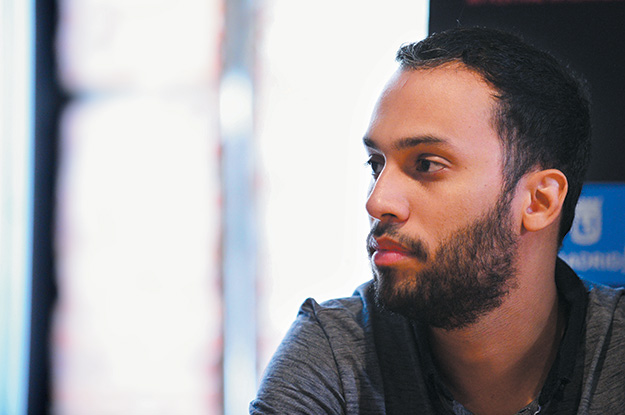In a scene from Parente, a documentary short about sexually transmitted diseases in the Amazon, indigenous Yanomami woman giggle during a sex education class as they pass around and examine an unwrapped condom. For all the sensitivities and complexity behind the foreignness with which they approach the idea of safe sex, the portrait of the women on the screen is comic and endearing. It is also effective.
“I don’t consider myself an activist. I love my characters and would never portray them as victims,” says Aldemar Matias, the 29-year-old director of the film. Matias’ attempts to illuminate sexual health issues among indigenous people in the Amazon have earned praise from government officials and the general public alike. It has also established the young director as a trailblazer in a region of Brazil not well known for producing films.
Born in Manaus, Matias never imagined that cinema could be a career option. Brazil’s fi lm industry is primarily based in Rio de Janeiro and São Paulo, and he had few models to emulate. Starting his career in advertising, Matias moved to TV as a reporter for Amazon Sat, where he first developed a love for the culture and people he found on assignments outside the bustling urban center in the heart of the Amazon.
“I didn’t have a lot of formal documentary education, but I had a lot of experience in television, and I knew that I wanted to go deeper (into the Amazon) and deeper into the characters,” Matias told AQ.
When Marcos Tupinambá, a friend and the producer of Parente, told him about a research project in the Amazon aimed at introducing rapid HIV and syphilis testing for the first time into indigenous communities in 2010, Matias wasn’t sure what he was in for. But he recognized the opportunity to tell an original story.
Working with researcher Adele Benzaken, Matias focused on two of the hundreds of Amazon tribes — the Tikuna and the Yanomami — that would be receiving sex education as part of the project, which was commissioned by the London School of Hygiene and Tropical Medicine and funded by the Bill and Melinda Gates Foundation.
The Tikuna and Yanomami were chosen to illustrate the need for a targeted approach to health testing and education among indigenous peoples. While the Tikuna regularly migrate between the village and surrounding cities, dressing in Western apparel, the Yanomami are much more isolated and preserve their traditional customs. Both groups present special challenges in combating and controlling sexually transmitted diseases like HIV. As Matias puts it, “I learned (that) it’s not about how many people are HIV positive. It’s about vulnerability, because a very low number can (spike) very quickly.”
Parente helped shine a light on those challenges, and has been screened at health conventions across the world. It was acquired by the Brazilian Ministry of Health and is shown to health professionals as part of their training before they begin working with native groups. While public policy regarding native peoples is controversial in Brazil, the project found widespread acceptance. On August 29 of this year, Parente was broadcast for the first time on television on Canal Brasil.
While Matias is happy about the recognition, he believes there is still a long way to go before filmmaking in Manaus can match the level of Rio de Janeiro and São Paulo. After recently fi nishing a two-year cinematography course in Cuba, Matias is touring a new short documentary, El Enemigo, on the fumigation of mosquitos in Cuba. But his ultimate goal is to apply the lessons he learns abroad to the budding fi lm movement in the Amazon. One step toward that goal: He’s planning a feature film that will focus on the tourism industry in the Amazon.
—
Rebecca Bintrim is an editor at AQ





